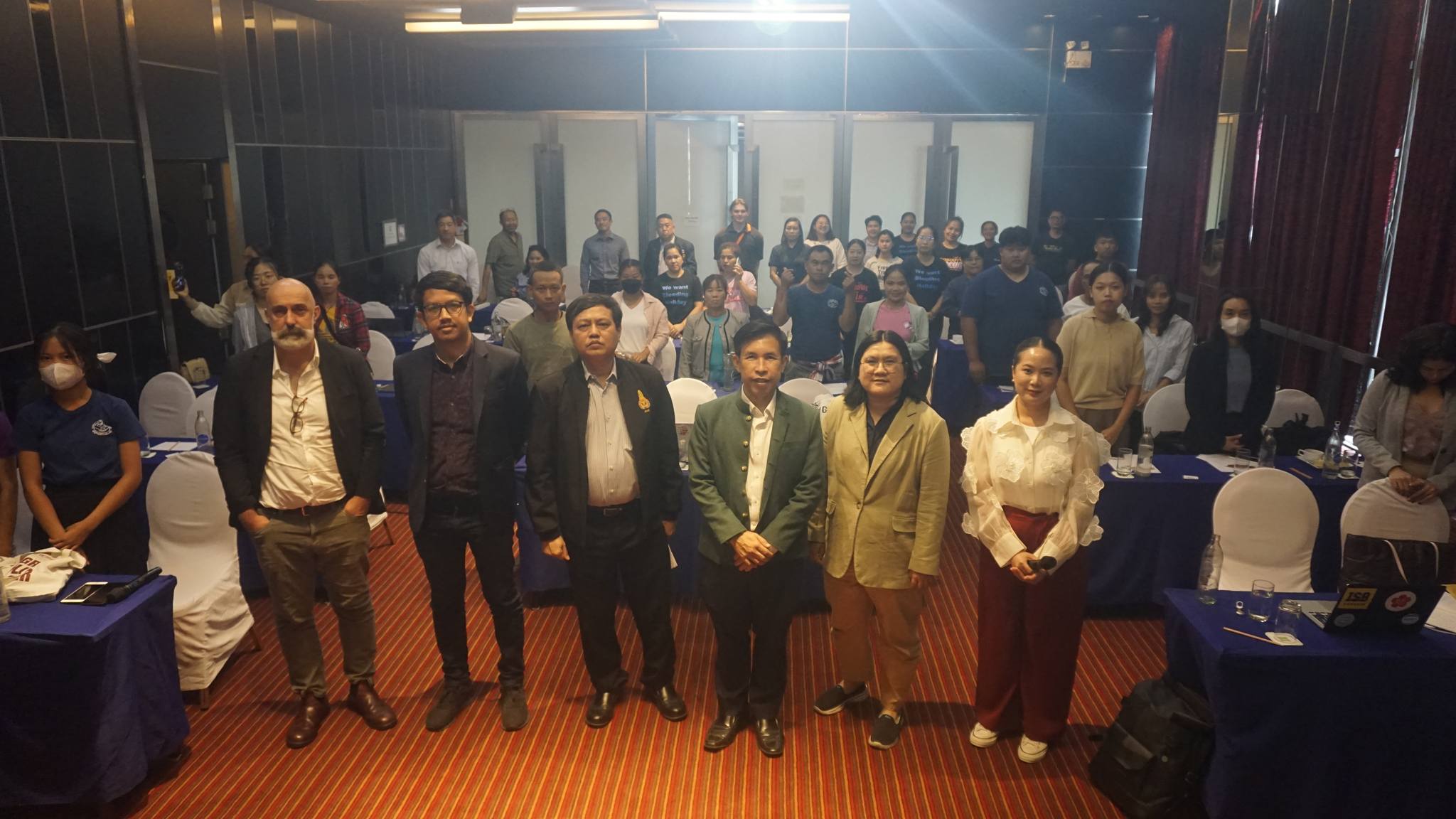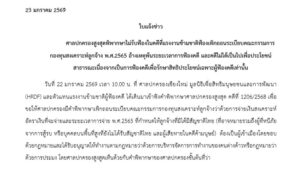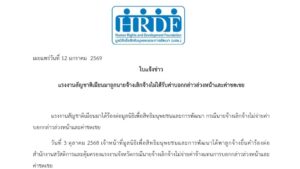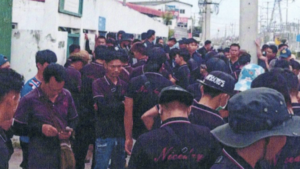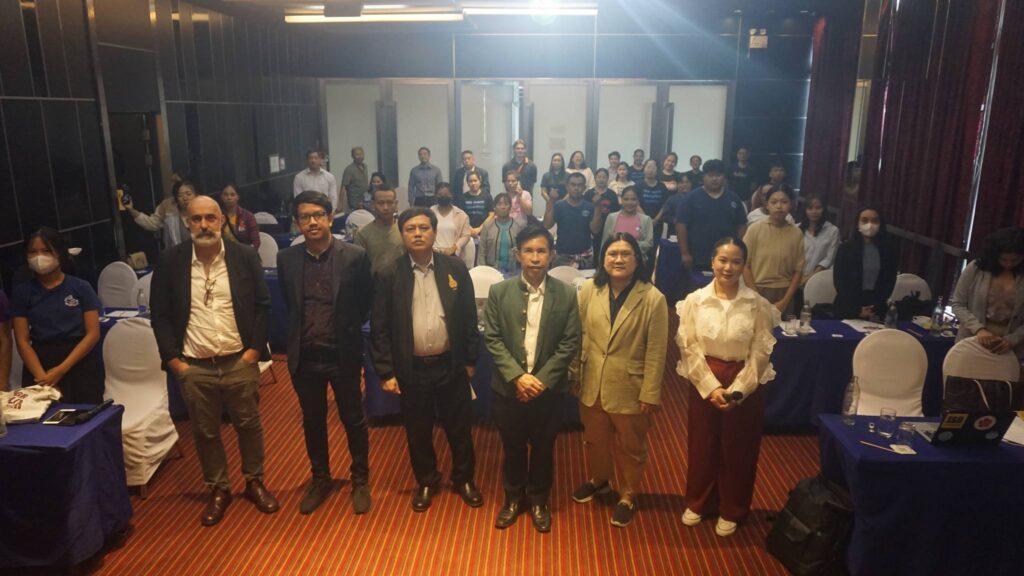
In Chiang Mai, an effort was made to organize a forum to brainstorm on how to promote the business implementation that respects human rights and labour rights under the 2nd NAP on BHR In the Northern Economic Corridor focusing on developing concrete models of protection, respect and remedy and to ensure its practical application, not only in the public sector, but the business sector as well.
19 June 2024, at the ibis Styles Chiang Mai Hotel, Muang District, Chiang Mai, the Faculty of Law, Chiang Mai University, in collaboration with partner organizations including the Human Rights and Development Foundation (HRDF) and the Solidarity Center, organized a seminar on “How to promote the business implementation that respects human rights and labour rights under the 2nd National Action Plan on Business and Human Rights (NAP on BHR) In the Northern Economic Corridor in Chiang Mai. It aimed to raise the awareness of the importance and understanding about the 2nd National Action Plan on Business and Human Rights for 2023 – 2027, to provide a space for exchange among stakeholders concerning the work on the protection, respect and remedy including government officials at the operational level, entrepreneurs, workers and civil society sector to explore how to further collaborate, and to brainstorm and prepare recommendations to promote responsible business implementation with respect for human rights.
Session 1 Seminar’s opening ‘How to promote the business implementation that respects human rights and labour rights under the 2nd National Action Plan on Business and Human Rights (NAP on BHR)’
Assistant Professor Dr. Chainarong Luengvilai Dean of Faculty of Law, Chiang Mai University, welcomed all participants emphasizing that as part of the academic sector, the Faculty of Law, Chiang Mai University, places an importance on human rights and works on the issue with various civil society networks, public sector, and academic sector for a long time including the issue of Business and Human Rights. For example, his faculty has organized events to track process of the implementation of the 1st NAP and has offered some recommendations to improve the 2nd NAP, has conducted research on issues concerning human rights defenders and studied and monitored issues concerning transboundary investments. For today’s event, the Faculty of Law, Chiang Mai University, Solidarity Center and HRDF would like to thank representatives from the Rights and Liberties Protection Department, the Northern Economic Corridor Policy Committee, Chiang Mai Provincial Authority, private sector/Chamber of Commerce, Thai and migrant workers and hoped that this forum shall mark the beginning of an effort to understand the principle of human rights and the NAP as well as to explore various challenges in labour sector in order to explore cooperation to overcome such restrictions and challenges.
Ms. Phenpiccha Jankomol, Human Rights and Development Foundation (HRDF) also gave a welcome address and alluded to the understanding of the principle of business and human rights and the national action plans. This was related to the United Nations’ Guiding Principle on Business and Human Rights (UNGPs) which have been issued for member countries to apply to ensure protection of human rights in business sector and its supply chain. Thailand has adopted the UNGPs since 2017 and has applied them to develop the 1st National Action Plan on Business and Human Rights (NAP on BHR) for 2019-2022. At present, the 2nd National Action Plan on Business and Human Rights for 2023-2027 has been issued covering four key areas (LEDI) including (1) Labour, (2) community, land, natural resources and the environment (Environment), (3) Human Rights Defenders (Defender), and (4) international investment to ensure protection of the people from being subject to human rights violation as a result of business implementation and to explore the prevention, mitigation and solution to the negative problems and impacts from business operation.
For the Northern area, pursuant to the cabinet resolution dated 31 January 2023 to declare four provinces in the North including Chiang Mai, Chiang Rai, Lamphun, and Lampang as part of the Northern Economic Corridor (NEC-Creative LANNA) to promote creative digital industries, tourism, medical tourism, agriculture and food through the application of the BCG Model (Bioeconomy, Circular Economy, and Green Economy) as the framework of the Northern Economic Corridor. It aims to promote decentralization of wealth to the regional area. Still, problems persist among workers in the North, particularly those in informal economy including in the agricultural sector, home-work, construction, service sectors, etc., which mostly employ migrant workers, foreign workers, or ethnic workers. As a result, workers in informal economy in the region do not afford human rights protection or do not have access to basic legal protection causing disproportionate impacts on these regional workers including their being paid below the minimum wage. This also affects their access to social security benefits, health insurance, capacity building, and sick leave and business leave, etc.
David John Welsh, Country Director, the Solidarity Center in Thailand, said that the implementation of business and human rights is not only related to the reform of laws in Thailand to ensure workers including migrant workers are able to become a member of labour union or to form a labour union. It also concerns international trade negotiations including the Special Economic Zone, Free Trade Agreement and other international trade negotiation. Therefore, all concerned sectors have to broaden their understanding on the issues including in the labour sector, employer sector, business sector, public sector, civil society, and multinational corporations which are supposed to be responsible and respect human rights.
The trend in countries sourcing from Thailand must be to give workers and unions access to seek remedies against againts multinationals abusing their supply chains or tolerating abuse within them. Thailand is particularly vulnerable in this area where labour rights in sectors like agriculture are largely non existent
Session 2: The implementation of public sector and business sector concerning human rights protection through the 2nd NAP
Anon Youngkhun, Head of the Working Group to Develop System and Assurance of International Human Rights, International Human Rights Division, Rights and Liberties Protection Department, alluded to the essence of the 2nd NAP that the public sector should place an importance on mandatory measures to implement the tools through the issuance of cabinet resolutions. This should apply to relevant sectors and business sector/state enterprise. At the moment, the measures are made on a voluntary basis and the public sector only expect the business sector to voluntarily adopt such human rights and responsibility. It is incumbent on the in-charge authorities to monitor such implementation and report to the public sector as to how much progress has been made concerning the implementation and compliance with the National Strategy.
It has been recommended by the public sector and the business sector under the framework of the 2nd NAP for Thailand to become a state party to the ILO Conventions and to reform its laws, regulations, rules and policies concerning labour to ensure their compliance with international standards, the development of the central labour database, the fair recruitment system and labour registration, the protection and assistance for workers and their training, the eradication of discrimination, exploitation and a lack of access to child support benefits among migrant workers migrant workers, the provision of channels for information exchange among concerned agencies to address labour issues, the effort to raise the awareness and promote practice in the business sector about human rights and various standards, the enhancement of grievance mechanisms, the enhancement of remedy, and the provision of dispute settlement mechanisms. Therefore, the mechanisms to drive the NAP shall be under the charge of the Committee to Mobilize Human Rights in Thailand, chaired by the Deputy Prime Minister and the implementation of the Committee to Implement the National Action Plans, which are national mechanisms. At the provincial level, it is the Provincial Governors to be Director of such mechanisms.
Boonchai Chatprathuangkul, Director of Area Development Strategy Division, National Economic and Social. Development Board (NESDB) said that the economic development plan in Chiang Mai aims to encourage investors to increase their investment to propel economic value. But in order to achieve the goal of investment and to access benefits, it is incumbent on the business sector to help develop human resources to catch up with modern industries in the future through collaboration with educational institutions. One of the progresses made in the North is the focus on ‘Creative Lanna’, or ‘creative economy’ to be used as a tool for development. This is simply a tool to ensure development in the four Norther provinces while another focus is placed on ensuring that wealth shall not concentrate only in Bangkok. In addition, the Northern Economic Corridor is an attempt to develop policies and mobilization to promote clusters of industries and reskilling and upskilling. The Special Economic Zone is therefore a tool to promote such implementation in the business sector and to offer privileges to investors who comply with the state’s policies. Therefore, at the national level, there must be coordination of detail of each of the plans with relevant in-charge authorities according to the 2nd NAP. For example, the Ministry of Labour and the Ministry of Commerce should engage simultaneously in reskilling and upskilling and labour protection. Apart from such recommendations, there should also be an effort to mobilize, evaluate and replicate the effort in other areas.
Decha Yingraksakulchai, Vice President of Federation of Thai Industries in Chiang Mai said that the private sector in Chiang Mai continues to receive investments and this is in need of a large number of workers. It is a fact that Chiang Mai is still home to fundamental manufacturing industries which need labour, most of whom are medium and low skill labour. The workers which are in high demand are migrant workers since most of the Chiang Mai’s entrepreneurs believe these workers can work better than their Thai counterparts. As to human rights, he finds the violations have stemmed from a lack of awareness of their respective roles among the employers and the workers and their lack of their legal responsibilities. At the moment, many legal disputes between the employers and the employees are piled up in the Labour Court. According to him, the justice process can cope with the disputes efficiently since it offers a mediation between the employers and the employees. He thinks access to legal rights and justice process is fine at the moment.
“From the perspectives of entrepreneurs, a Happy Work Place means a safe workplace. The working environment must be robust, strong and properly invested…. At the moment, in order to hire homeworkers, the entrepreneurs have to resort to services from agents. It is important to ensure these companies act in compliance with the labour law and make an effort to ensure the authenticity and accuracy of official papers. This is an important factor inducive to the recruitment of employees via such agents,” said Decha.
As to the disputes between the employers and entrepreneurs and the workers, Decha said that to be fair, we have to pay attention to detail and look at them from viewpoints of both parties. The employees have to ask themselves if they have the skills that match the work, or not, or if they are qualified for such work, or not, to ensure that they shall not be exposed to danger or to bear too much risk of occupational accidences due to their lack of skills. Meanwhile the workplaces have to act in compliance of the law concerning business and human rights.
“Frankly speaking, I try to ensure my compliance with the law. I shall not do anything in contravention of the law. Nowadays, when you apply for jobs, they will see if you are qualified for them. If not, they won’t admit you. They have the right to review whether you have the qualifications they need or not. If you are no qualified for the jobs, you can look for something else since there are so many jobs. In other word, both parties have to understand and protect their rights while ensuring that they shall not infringe on the rights of the other party.”
Decha said that as to NAP on BHR, it is something the Federation of Thai Industries has to take seriously. The business people cannot deny that they are not aware of labour rights; this should not happen. It does not matter if they are migrant workers or workers from any countries, they all are entitled to equal treatments since they work in Thailand. The Federation of Thai Industries offers chances for people for lodge their complaints. We hold talks with any member businesses about the matter. If they are not our members, the Chamber of Commerce would help to ensure they operate their businesses according to the law. We have published guidelines or manuals to raise the awareness among the public and private sectors about how to act in compliance with business and human rights.
Rungthiwa Chansri, Labour Specialist, Professional Level, said that there are challenges concerning employments in Chiang Mai. Most problems concerning migrant workers in the area are concerned with how alien workers ran away to work for a new employer causing their previous employer to be subject to a fine. That an alien worker has changed to a new employee without informing their previous employer is one of the most common problems. Otherwise, some manage to work without permits. Such problems have to be dealt with by the Department of Employment (DoE). It is being recommended to reregister all alien workers from the countries including Laos, Cambodia, Vietnam and Myanmar. It has been proposed as a policy recommendation to the Ministry of Labour in 2024 to establish a one stop service and to allow private sector to run the whole registration in one place. As to the expense incurred from the registration as required by the cabinet resolutions, it has been lately proposed to develop a clearer policy on this regard. It shall follow the guidelines and the legislations shall be enacted to allow the importation of labour systematically and legally to meet the demand of labour according to the MOU on the strategy to prevent refoulment. The workers do not need to stay in hiding. Their employers must bring them to register according to the law.
Nan saw yin, Chairperson of the Migrant Workers Federation / migrant workers said that it is a challenge for migrant workers in Thailand since they are required to pay quite an expense fee to apply for personal documents and the employers are reluctant to process their papers. Some employers are not responsible even though they are legally required to ensure the legal employment and to address a lack of access to the right to health including social security, Workmen’s Compensation Fund, etc. Meanwhile such employees have to engage in dangerous work. Most migrant workers in Chiang Mai are employed in agricultural sector, husbandry, construction and service sectors. Since they have no access to such benefits, when they suffer from occupational injuries, they may not receive the protection. Many have to live in a vulnerable condition and live here illegally. In the North, more than 50% of the migrant workers lack access to health insurance. In addition, the migrant workers are impeded from exercising their freedom of association and collective bargaining. We therefore call on the government to consider ratifying the International Labour Organization (ILO) Conventions No. 87 and 98 to promote freedom of association and collective bargaining among workers in all sectors.
Challenges concerning the implementation to protect human rights in business sector in Thailand and the relevance of overseas legal mechanisms applying to businesses
“It is unique among workers in the North since most of them are migrant workers, stateless and nationality-less persons. In comparison to the Thai workers, these migrant workers are much more vulnerable … It is insufficient to look at the issue only from the point of view of the employees and the employers. It is important to view it from the overall picture of business chain…In addition, voluntary measures for business sector might not be sufficient. It is recommended that there should be laws to encourage business sector to respect human rights and to ensure they pay more attention to labour protection,” said Kornkanok.
Kornkanok Wathanabhoom, ETOs Watch, said that in Chiang Mai, the authorities have to start from identifying the supply chain in Chiang Mai by selecting the businesses that warrant further study including construction, agricultural business, etc., since each of the businesses are different. After acquiring the clear supply chain in the North, it shall enable them to identify the stakeholders including the business sector and labour sector.
As to protection and remedy, there are several concerned mechanisms including the financial institutions and their lending criteria which may consider human rights violation, or the mechanisms of the Office of Securities and Exchange Commission (SEC) which require that a lister company has to prepare 56-1 One report to demonstrate how their chain of value and chain of business comply with the Environment, Social and Governance principles (ESG), etc. Once we can identify individuals concerned with such chains, it is then possible to call on them to protect genuine protection and remedy.
Nonetheless, various measures only apply to business sector on a voluntary basis. Therefore, according to Kornkanok, the NAP has to be revised to include indicators which demonstrate what the business sector has done. Most importantly, such voluntary measures should be transformed into legally binding measures. Meanwhile, the government agencies should consider proposing a statutory law to legalize such measures. This is the direction to which Thailand should pursue similar to other countries which have made a move toward this direction.
“What is most exciting is a legislation of the European Union (EU) which has been adopted by the European Parliament last week, called the Corporate Sustainability Due Diligence (CSDDD) which shall apply to all member countries within the European Union. Therefore, any trade partner with the EU is required to act in compliance with the law as well,” said Kornkanok.
Kornkanok has cited mechanisms from abroad including from the United Kingcom, Australia, and California and its domestic law called ‘Modern Slavery Act’. Several other countries have adopted ‘Human Rights Due Diligence (HRDD)’ law including Germany which is called ‘Supply Chain DD Act’. This shall apply instantly to us if we have any business deal with our partners in Germany. In Norway, an emphasis has been placed on decent work. France has become the first country to adopt ‘Duty of Vigilance’ law to force all large corporations to prepare HRDD plan without which they can be held to account in the Court of France. Lately, the European Union also announced that it shall adopt the Corporate Sustainability Due Diligence Directive (CSDDD).
In addition, the all member-countries of the Organization for Economic Co-operation and Development (OECD) to which Thailand is a member, are obliged to act in compliance with the OECD Guidelines for Multinational Enterprises on Responsible Business Conduct. One benefit of this is for any company wherever they operate their business, if they fail to act in compliance with the Guidelines, the affected parties shall have the right to complain with the ‘National Contact Points’. Although it is not legally binding which is probably its weakness, it encourages a negotiation to address the problems at the structural level. In Thailand, the Rights and Liberties Protection Department has prepared a report on the issue and has designed how Thailand’s National Contact Points should be. Therefore, the review of how to act in compliance with business and human rights principle sets the framework to demonstrate how Thailand is relevant to the world, and why it is necessary for Thailand to adhere to this principle seriously.
Akhom Suwankantha, Vice President of Chiang Mai Chamber of Commerce alluded to the five recommendations from the private sector including;
- A ‘new strategy in Thailand’ in response to foreign workers or migrants who become workers in Thailand to ensure they have access to rights protection and legal status. It is believed that if the authorities obtain accurate and measurable data of migrants, it shall offer economic benefits. Once such workers are recognized as permanent residents, they shall become part of the effort to develop the country and to pay income taxes to the government.
- The one stop service has to rely on accurate and efficient database or big data prepared by the state in order to track the accurate number of migrant populations.
- The access conditions to the Social Security Fund and the Workmen’s Compensation Fund have to be clearly distinguished between the Thai and migrant workers and they have to be properly designed.
- In order to address the weaknesses of labour registration pursuant to the cabinet resolutions and the MOU labour importation, an effort has to be made to tackle the issues from the country of origin to the destination country. The current system tends to make migrant workers have to rely on brokers and require high expense.
- Respect all workers as they are all equal workers without any racial discrimination. An effort has to be made to ensure mutual learning and respect between the employers and the employees. We must bear in mind that these people have come here to work to help develop our economic corridor in Thailand.
“There has not been an effort to raise the awareness, understanding or to listen to recommendations from the labour sector. How can we ensure workers are aware of human rights and have a better understanding? At the moment, we are advocating for the application of labour protection law with sex worker. Still, there is not clarity, it has been written that they belong to a vulnerable group. Meanwhile, most government agencies tend to rely on sub-contract work, which is a violation of labour rights. Therefore, it is important to ensure the 2nd NAP can be applied and the state stops relying on sub-contract work since you are promoting the violation of human rights,” said Sukanta.
Sukanta Sukpaita Human Rights and Development Foundation (HRDF) alluded to her concrete expectation of the 2nd NAP, which is yet to have clear detail. According to her, there is still the lack of enforcement concerning respect of businesses on human rights. As a worker, she noted that the issue has been discussed more widely among business sector rather than labour sector. There has been no effort to promote the discussion among workers about such NAP. There is also no representation of all stakeholders in the NAP’s implementation. Therefore, an important concrete outcome from the NAP-2 must include the state’s ratification of the ILO Conventions no. 87 and 98 to ensure workers have the right to associate and to organize to increase more spaces to discuss the matters between the employers and the employees. But in this regard, it appears the National Security Council still places too much importance on national security, more than on respect of human rights, even though there are nearly one hundred thousand of migrant workers in Chiang Mai. The problems arise since most workers have not been registered and have been exposed to discrimination, and restriction of their freedom of movement. In terms of the protection mechanisms and the roles of businesses in remedy, Thailand adopts many laws that offer proper remedies such as the Workmen’s Compensation Fund, Social Security, etc. But access to such rights is challenging and restricted including birth registration or access to child allowance. Even among workers who are insured persons, they still face problems trying to access the benefits. Therefore, to ensure the NAP-2 is implemented, the state must ensure all concerned people are aware of information equally among employees และemployers as well as concerned authorities.

